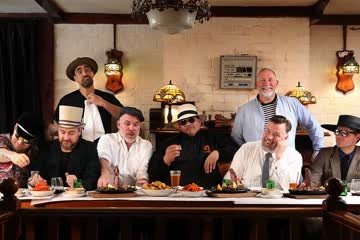Five Formerly Earnest Songs That Are Impossible To Take Seriously Any More
One person's inspiration is another's laughingstock
It's no secret that the music industry is a tough gig in which to make a dime, but there is one option for aspiring musicians that generally offers a reliable return rate: synchronisation deals for TV and film.
Indeed, even a cursory glance at Google will unravel a wealth of links on how to get your song on the screen and the mad stacks in your pockets so you too can start enjoying the finer things in life, like not sharing a house with nine backpackers and their illegal ferret, or finally owning a mattress made out of actual mattress.
Still, as alluring as it sounds to sleep on a bed not built from collapsed moving boxes, money isn't everything. Even though sync deals are a good way to gain wide exposure and sweet cash for your creative energy, sometimes it can totally ruin a song, and then you have to live with that. Granted, it can also totally make a song, as when the second season of cult Adult Swim hit Rick & Morty used Do You Feel It? by US indie-poppers Chaos Chaos to absolutely devastating effect at the end of its third episode, but, more often than not, your well-intentioned musical slice of self stands to completely lose its identity as soon as some jerk goes and slaps it against some random film or television scene.
Consider, for example...
Don't miss a beat with our FREE daily newsletter
Vangelis — Chariots Of Fire
In 1981, venerated Greek composer Vangelis wrote the title instrumental theme for British historical drama Chariots Of Fire. A sweeping, grandiose overture for an electric orchestra used to soundtrack moments of high-stakes, heartfelt drama, the song originally evoked an intangible sense of pride, inspiration, and overcoming adversity; the sorts of terms and ideals that used to be emblazoned on motivational posters by people who think that life matters. Y'know, before motivational posters also lost their effectiveness and became templates for dick jokes and Werner Herzog quotes.
Now, though? Well, the London Olympics used it to soundtrack a Mr Bean sketch, there are literally a million other parody videos of the film's opening beach scene on YouTube, and countless shows (usually sitcoms, but not exclusively) have used it as an aural cue for pretty much any scene that involves someone running in slow motion. Actually, that's basically the trope these days: Make someone run in slow motion, for any reason at all, and slap Chariots Of Fire on it. Comedy points instantly gained if the runner is not a natural runner. Aaaaand profit.
It bears mentioning that this song won a frigging Oscar. Literally nobody is safe.
Gerry Rafferty — Baker Street
Scottish songsmith Gerry Rafferty couldn't have known that he and instrumentalist Raphael Ravenscroft were unleashing what would become one of history's best-loved sax solos when, in 1978, he released Baker Street as a means of singing away his financial and legal blues.
With lyrics steeped in real-life frustrations brought on by messy legal proceedings following the demise of previous outfit Stealers Wheel, and inspired by late-night jam sessions with a mate who lived in a unit off, yes, Baker Street in London, the song could be an enduring soft-rock standard (if the wider piece wasn't so middling) — but, instead, all anybody seems to remember is the damn solo.
It's a versatile piece, too — over its small-screen life, it's been used to denote everything from casual coolness after blowing up a spaceship of aliens to unwelcome sex dreams, and it works equally well at either extreme; it's just that wonderfully pliable and OTT a piece of music.
Well, except at the end of Lisa's Sax. That's actually still a pretty genuinely sweet use of the track, regardless of how cheesy the solo seems otherwise now, but let's call it the exception to the rule.
Imogen Heap — Hide & Seek
There are definitively two main culprits to blame for the utter ruination of Imogen Heap's Hide & Seek, probably better known by its iconic refrain, Mmm Whatcha Say: The OC and Saturday Night Live.
The 2005 tune rocketed to wider attention when it was used to score the second-season finale of the former, providing the icing on the already melodramatic cake that was the ordeal of Mischa Barton shooting the brother of her ruffian love interest, before Andy Samberg, Bill Hader and a rotating door of guest shooting victims took it to extremes in 2007's Dear Sister parody sketch for SNL's digital team.
As a result of that sketch, YouTube exploded with copycat parody videos, with Hide & Seek, over the past eight years, being stitched on top of pretty much every single death scene you could possibly think of, and then some, not only totally kiboshing any hope the song had of regaining a sense of earnestness but also flogging the original joke within an inch of its life. Well, you only meant well. Of course you did.
Richard Strauss — Also Sprach Zarathustra
Immortalised by Stanley Kubrick's 2001: A Space Odyssey, Richard Strauss' classic piece Also Sprach Zarathustra (Thus Spake Zarathustra) — or, more specifically, its opening fanfare, Sunrise — was used by the master director and renowned asshole to instill a sense of grandiose awe in his audience, aided by a package of breath-stealing spectacle; the glacially moving planets, the majestic, galactic scope, the minimalist framing, the stark colour contrasts — all combine to create one of the most memorable opening scenes in 20th-century cinema history.
But it didn't take long for it to start losing gravitas — three years after Space Odyssey's 1968 release, Elvis Presely started using it as his walk-on theme music at concerts, right up until his death in 1977, which is an increasingly sad notion the more you think about the public physical deterioration suffered by the King in his final years; it's also been used by Dream Theater and Green Day. Add to that a ream of soulless syncs — from commercials (remember Master Builders Australia's radio ad?) and dramas to comedy films such as Zoolander, Hot Stuff and even Turner & Hooch — and you've got a piece of classical music totally robbed of any remaining impact beyond a chuckle or two.
Leonard Cohen — Hallelujah
Zack Snyder's Watchmen was many things, but it wasn't subtle. In fact, in parts, it was downright clunky and a little physically uncomfortable to watch, such as when someone made the decision to have Nite Owl and the Silk Spectre fuck in an aircraft to the sweet sounds of Leonard Cohen's Hallelujah. This was clearly a bad decision since, somewhat hilariously, the songwriter himself finally spoke up in Watchmen's wake to say 'enough's enough' with Hallelujah syncs. That's an unsurprising development, because good lord is this scene a walking testament to how not to soundtrack a sex scene, unless the end goal is to permanently cure me of the ability to gain an erection.
Of course, Watchmen didn't create the trope; it merely served as the straw that broke the camel's back. Hallelujah has been used, and misused, for years. For double points, The OC is guilty here also, pre-dating their Hide & Seek treachery with a spot of Hallelujah, only with the added pain of drawing on the trendier version recorded by the late Jeff Buckley to sync with their season-one finale montage of sad teenagers and sailboats. Even then, they're not solely to blame; Buckley's cover alone — not including any of the myriad other versions recorded over the years — has also appeared in everything from Scrubs, House and ER (probably when a patient died in each case, honestly) to Ugly Betty, Without A Trace and The West Wing.
If there's a song the world of film and TV should really just leave alone, it's this one. That would be real cause for a hallelujah.








